Images: Courtesy of Cassie Sharpe
Some would say being the middle child has its downfalls but for Cassie Sharpe, it has shaped her into the athlete and competitor she is today. Sandwiched between two brothers, Sharpe started skiing at the age of 12 when her dad got a job at Mount Washington on Vancouver Island. There, she and her siblings ran wild, pushing each other to try tricks and compete in the local slopestyle competitions. Unknowingly, this kickstarted her long and successful career as a freestyle skier. Sharpe won her first halfpipe competition in 2012 and she became the first Canadian woman to take home an Olympic gold medal in the discipline at the 2018 Pyeongchang Olympics. On the X Games super stage, Sharpe has racked up two gold medals, one silver and two bronze to make her one of the most dominant women in the Superpipe.
Two years ago, Sharpe took a step back from competitive freestyle skiing to focus on her personal life, most notably, giving birth to her baby girl. It was never the intention to make a comeback but the competitive urge has returned in full force and she’s ready to drop in once again. Never one to shy away from a good challenge, this Winter X Games marks Sharpe’s incredibly inspiring return to the big stage in hopes of making it to the 2026 Winter Olympics in Milano-Cortina, Italy.
It’s one thing to chase the podium in an already stacked field of women and it’s entirely another to do so after giving birth and taking care of a child. We caught up with Sharpe to see how the comeback is going, so far, what she’s doing to get back in competition shape, both mentally and physically, and how the hell she seems to juggle it all. Continue reading below for the full interview.
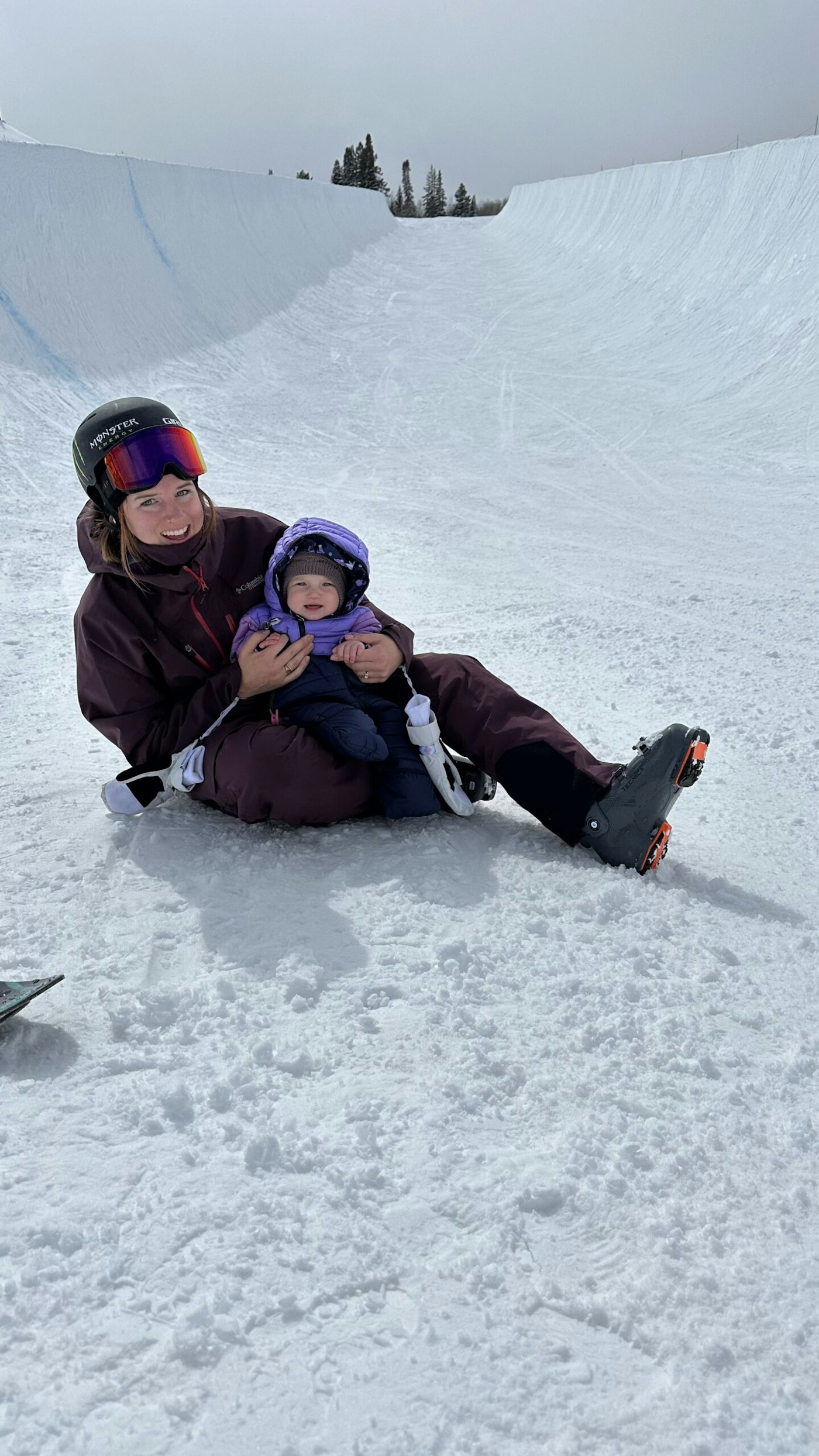
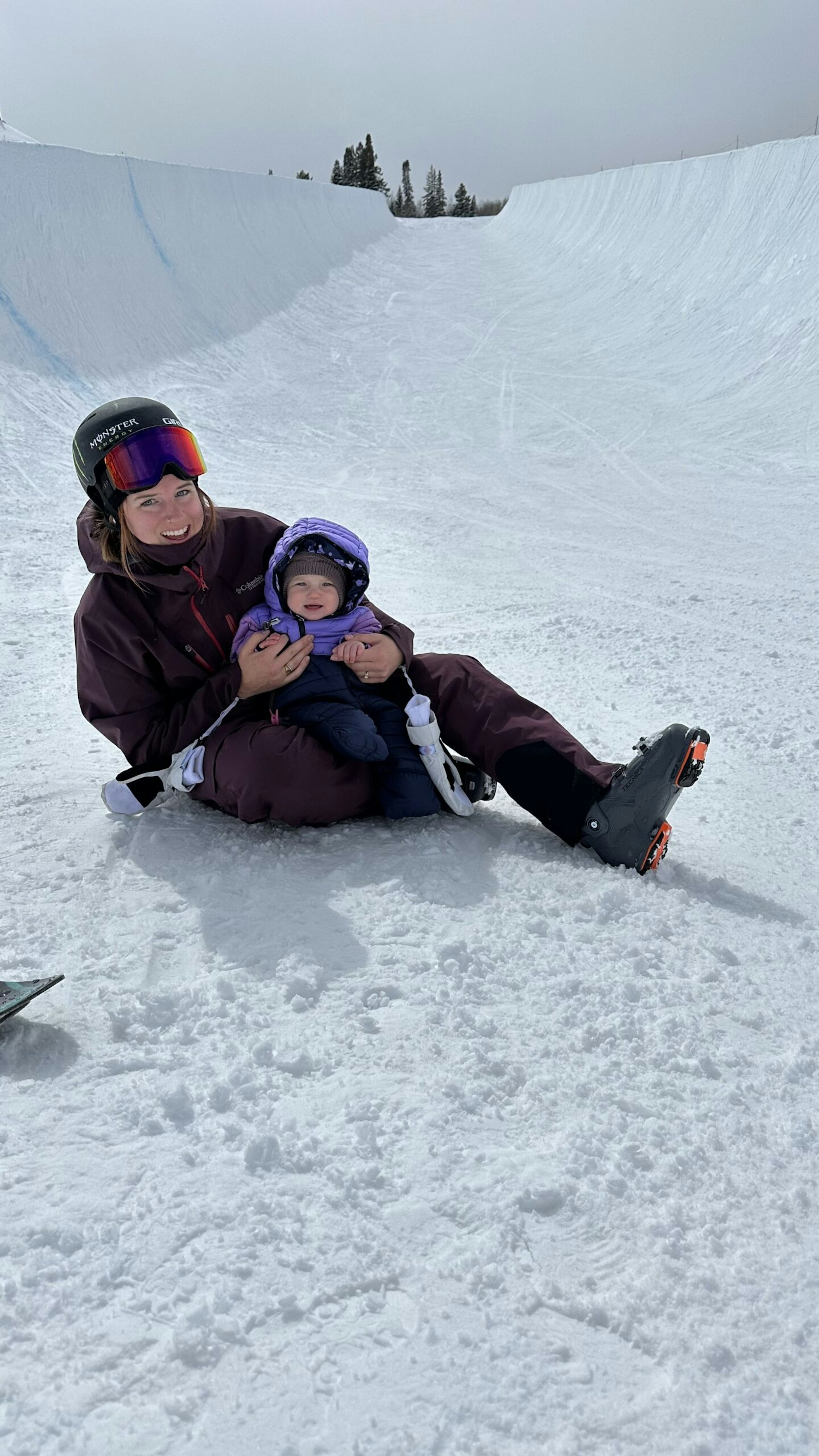
How are you? How did pre-season treat you?
In November, I was in Austria training at Kitzsteinhorn. I also spent some time in Whistler at the gym—getting back into the routine!
You took a two-year break from competing to have a baby, how has motherhood been so far?
It’s definitely a lot [laughs]. It’s pretty cool, there are so many sides to it. It’s so cool to watch a baby learn and develop close up. I feel like I’ve always seen my friends have kids and you see them every week or every other week and they’re making strides, but to watch it up close and personal is very cool, very interesting. I just love her so much, it’s crazy.
When was the first time you got back on skis after giving birth? How did it feel?
It was scary at first and then I did just a couple of groomer laps and it really was like riding a bike. I got right back into it and into the thick of things [when I] filmed a part for Warren Miller in Colorado in early March [2024]. I filmed a part for their 75 film and it was my first time back in the pipe, first time corking and doing all that and it was very nerve wracking but also so cool to see it all come back.
In that segment you work with teammate Alex Ferreira, how was that experience working with him?
So much fun! I can’t even put a number on it, but we’ve known each other a long time and we’ve been co-Columbia athletes since 2017-18, so we’ve worked closely together on a few projects now and every time it’s always so much fun. We enjoy ourselves so much—we get along really well and having someone who has known me before the Pyeongchang Olympics, being there with me for each milestone in my career, has been pretty cool. We’ve definitely developed a friendship through it all.
Did you see a shift in your confidence while filming with Alex?
Yeah, I think having someone who’s your cheerleader no matter what, whether you’re doing two-foot straight airs or a five-foot cork—he’s just hyped no matter what. There’s no pressure ever coming from him and I feel like that’s a very easy person to film a segment with, especially when it’s your first time back in the pipe since having a two-year break. He’s been such a good energy, lots of fun to be around.
Did you always see yourself coming back to the halfpipe after having your baby?
No, actually! I knew that I wanted to have a kid, I didn’t really know the timing and then I got married, we went on our honeymoon and then I got pregnant and I was like—okay, I’ve done what I needed to do or wanted to do, I think I’m good, I’ll be okay to not compete anymore.
All throughout my pregnancy I didn’t think I would go back and then I watched X Games 2024 and I was watching the girls and I could feel myself kind of being a bit envious, a bit jealous that they were all in the pipe and sending it, going big and I had that little butterfly energy—like, okay maybe I’m not as done as I thought I was.
From that, Justin [my husband] and I had some pretty big conversations about how we could make it work and if we could make it work. What could we do to make it a reality and I’m very, very lucky to have such a supportive husband and supportive mom and parents, everybody around me. It’s been really cool just watching everybody rally behind the idea of going back for a third Olympics.
What were your biggest hesitations about coming back to such a high level of competition?
Anybody who competes in an extreme sport with high risk—regardless of if you have a baby or not—you’re always weighing the pros and cons, always thinking about the risk and reward, what can go wrong and what can go right. And what is the motivation? Is it because I want to go back to the Olympics? Is it the adrenaline rush? Is it because I want to show Louella [my daughter] that you can do anything, you can put your mind to it and achieve something super cool even after having a kid? I think that I’ve always held myself up to a pretty high standard of how I want to compete at a really high level. I want to make sure I’m going to the gym, I want to make sure I’m doing everything that I possibly can to be successful. So to almost show her that work ethic and be able to build myself back up to that. I find it interesting how the human body functions and how you can manage all of that.
I’ve heard birth can be tough to come back from, how has the process been for you to get back to competition strength, physically and mentally?
Oh, for sure. I ended up having a couple complications in birth, so I ended up in an emergency C-section. That was not only the mental side of things but the physical, coming back from a surgery that goes so deep into your abdomen. I’ve had surgeries before but it’s always been pretty superficial, just bones and ligaments, but that surgery is something else. Coming back from that and having a tiny baby and needing to go to the gym and do all the things you got to do while also recovering from surgery was a really interesting path for me.
Honestly, to double back on the last question, to be able to see the risk and reward and weigh them at a higher value—I need to go to the gym, but also my baby needs to eat, my baby needs to nap. If I get back in the pipe and I get injured, that doesn’t just affect me anymore. It affects my child, it affects every aspect of my life, I can’t just come home and rehab, I have to think about her. It’s changed my mentality. I always want to push myself and learn new tricks but now I also have another little person to think about.
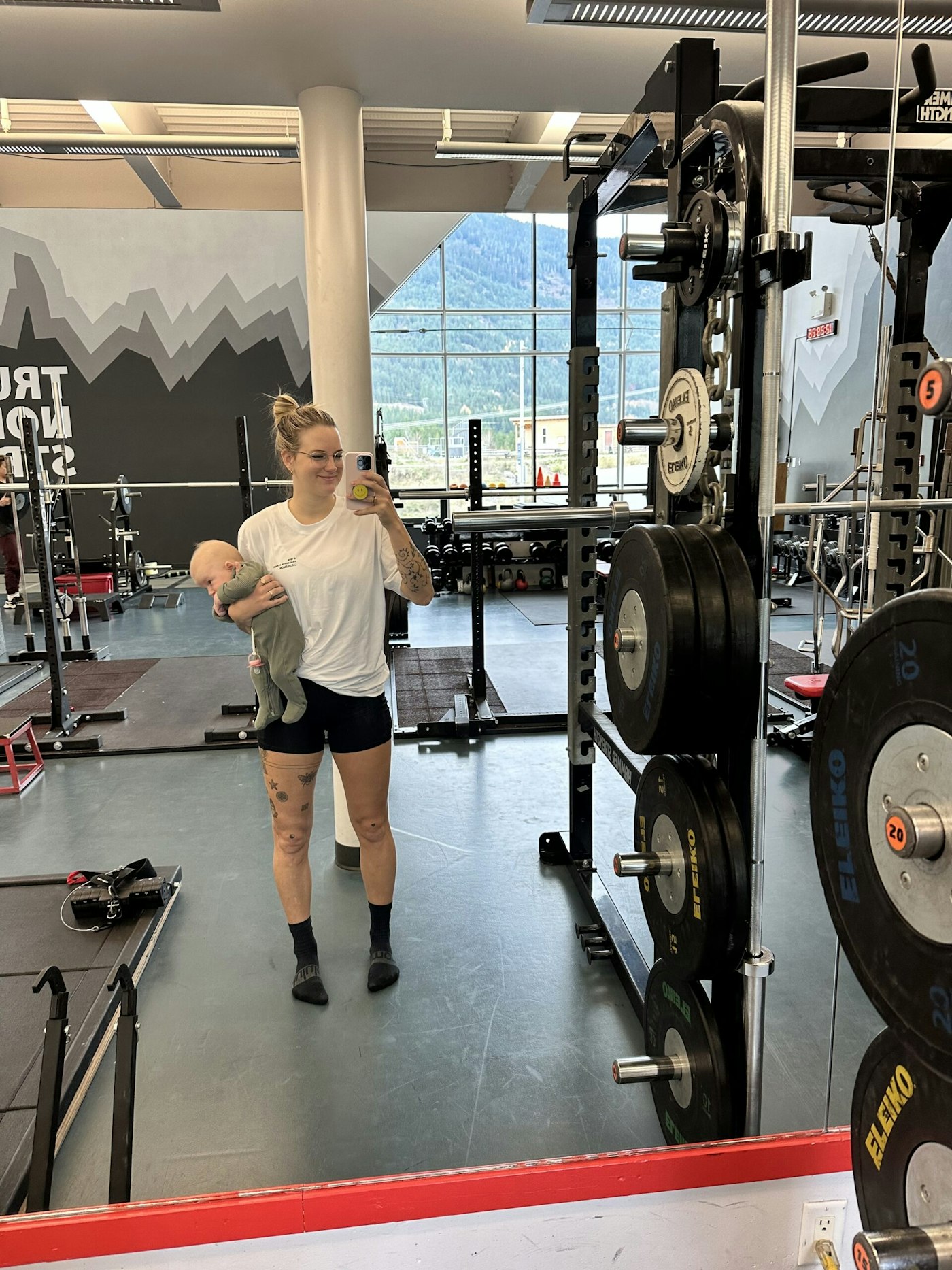
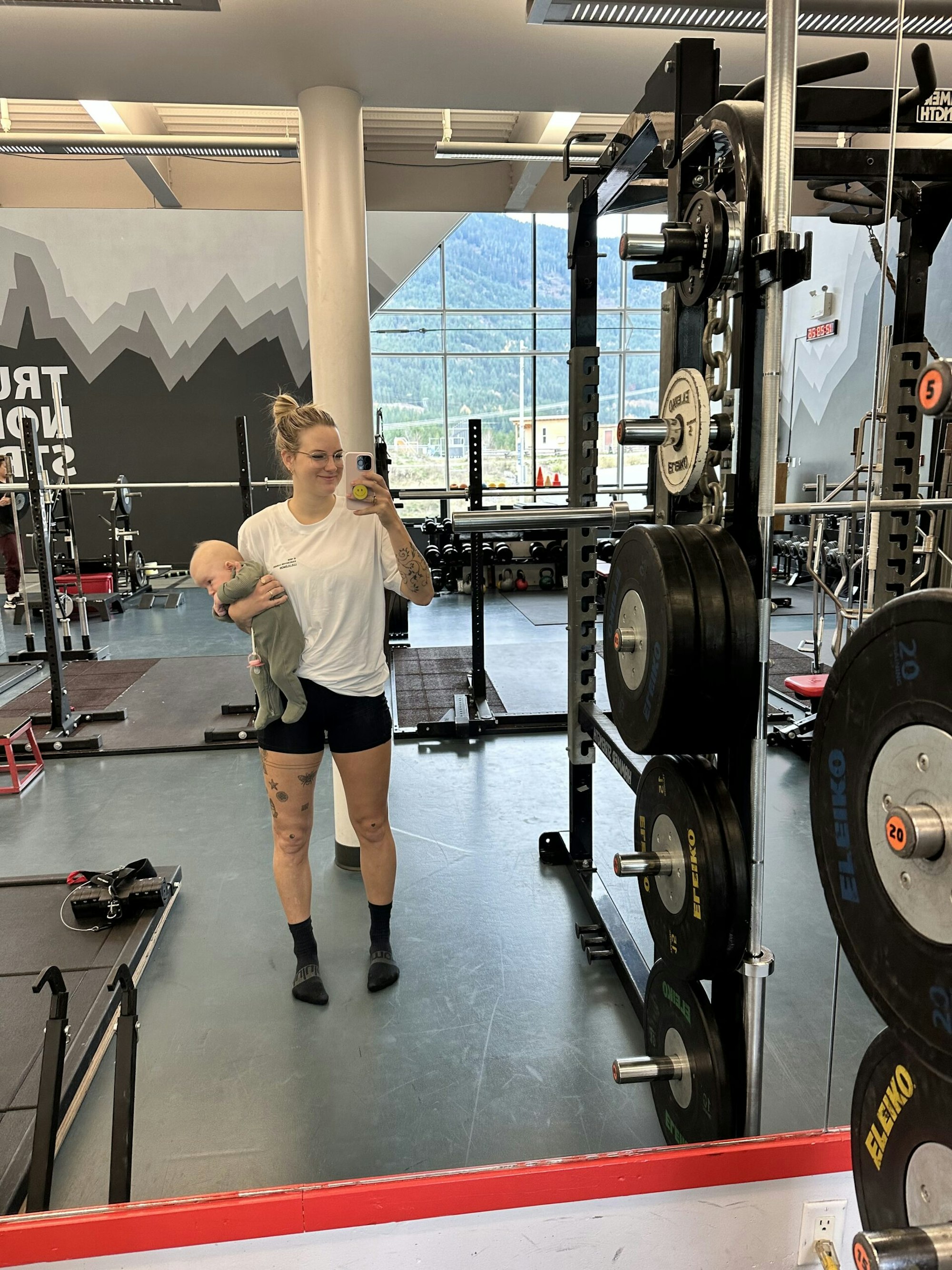
What does the average training day look like for you, now that you have a baby?
It’s kind of similar and super different [laughs]. It somehow feels the same but it’s also so crazy compared to how it was. When they’re newborns and they’re really little, they’re really malleable, you can bring them around and keep them in the stroller, they nap everywhere. But now that she’s walking and a bit independent, it’s more challenging to bring her to my training sessions, to keep her busy and entertained. We eat a lot of snacks [laughs].
Everyday she’s up at 8am, so we wake up, I make her some breakfast, we hang out and play in the living room, then we drive up to Whistler to the national team training gym. I’ve got a crew up there, we go to the gym at the same time and it’s always the same people, so Lou has gotten very comfortable with some of the ski cross athletes and mogul athletes. They all love her so it’s really helpful that I can bring her and it’s not a burden. Everyone is pleased to see her.
My gym trainer Andrew is the best. If I’m in the middle of a set and she’s freaking, he’ll go over and give her water or whatever. Those sessions usually last two hours, sometimes longer if we’re really tending to Louella’s neediness and then we drive home [to Squamish], which is about a half an hour. I’ll put her down for a nap and then I’ll food prep for the day—I’ll cook dinner. Then we’ll have lunch, have dinner, I put her down for bed and then we do it all over again, every single day until we hit the road.
What did you least expect in returning to the halfpipe?
I think it’s actually been really cool for me because I’ve gotten this renewed sense of fun. I was really in it as a competitive Olympic athlete—that’s what I was doing, that’s what I was there for. Now, coming into this season, I know this is definitely my last Olympics so I feel like I’ve given myself a bit more leeway to enjoy myself and have some fun and play around. It’s serious but it’s not that serious. I really didn’t expect myself to be able to sit back and have as much fun as I’m having.
How does your family feel about you juggling motherhood and skiing? It looks like your mom is a huge support.
My mom is an instrumental piece to the puzzle. She’s taken a leave of absence from her work and has dedicated her time to travel with me and Lou to the contests and chase the World Cups and the snow. She has been amazing, obviously, moms are just the best. The first World Cup in New Zealand we all ended up getting super, super sick and ended up having to take Lou to the hospital the night before qualifiers, it was just a nightmare and she held strong all the way through, made sure we were alive and functioning and I literally wouldn’t have been able to do that without her there. It’s been a huge blessing to have my mom, someone I trust so much, to support me and be there with me through the good, bad and the ugly.
We’re filming a docu-series on my return to sport, so we’ve had a few sessions filming that, which has been really fun and interesting to watch her in front of the camera [laughs]. She’s French Canadian, so she has a lot of funny quirks. I don’t think I’ve spent this much time with her since I’ve lived at home, so being on the road with her and the quirks, some are funny and some I’m like—oh my gosh mom, you have to fix that [laughs].
Lou is obsessed with her, she loves her and traveling has been very seamless having my mom around. The other piece of that, in the big picture of things, is bringing my mom to New Zealand and showing her where I’ve been for the last 10 years, like this is a place that I love, this is my favorite restaurant, this is my favorite hike. Being able to show her where I’ve been and what I’ve been up to has been really, really cool.
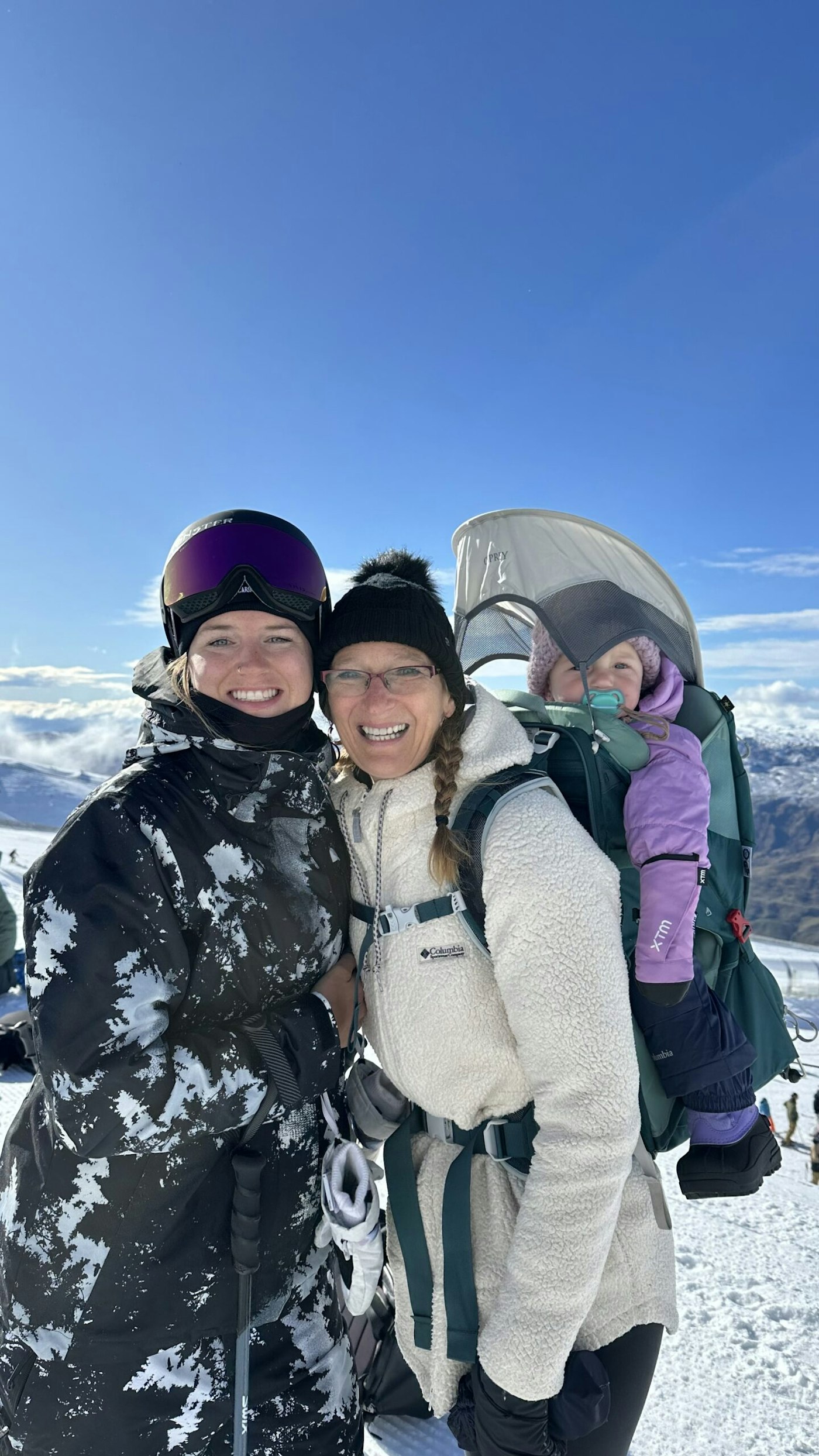
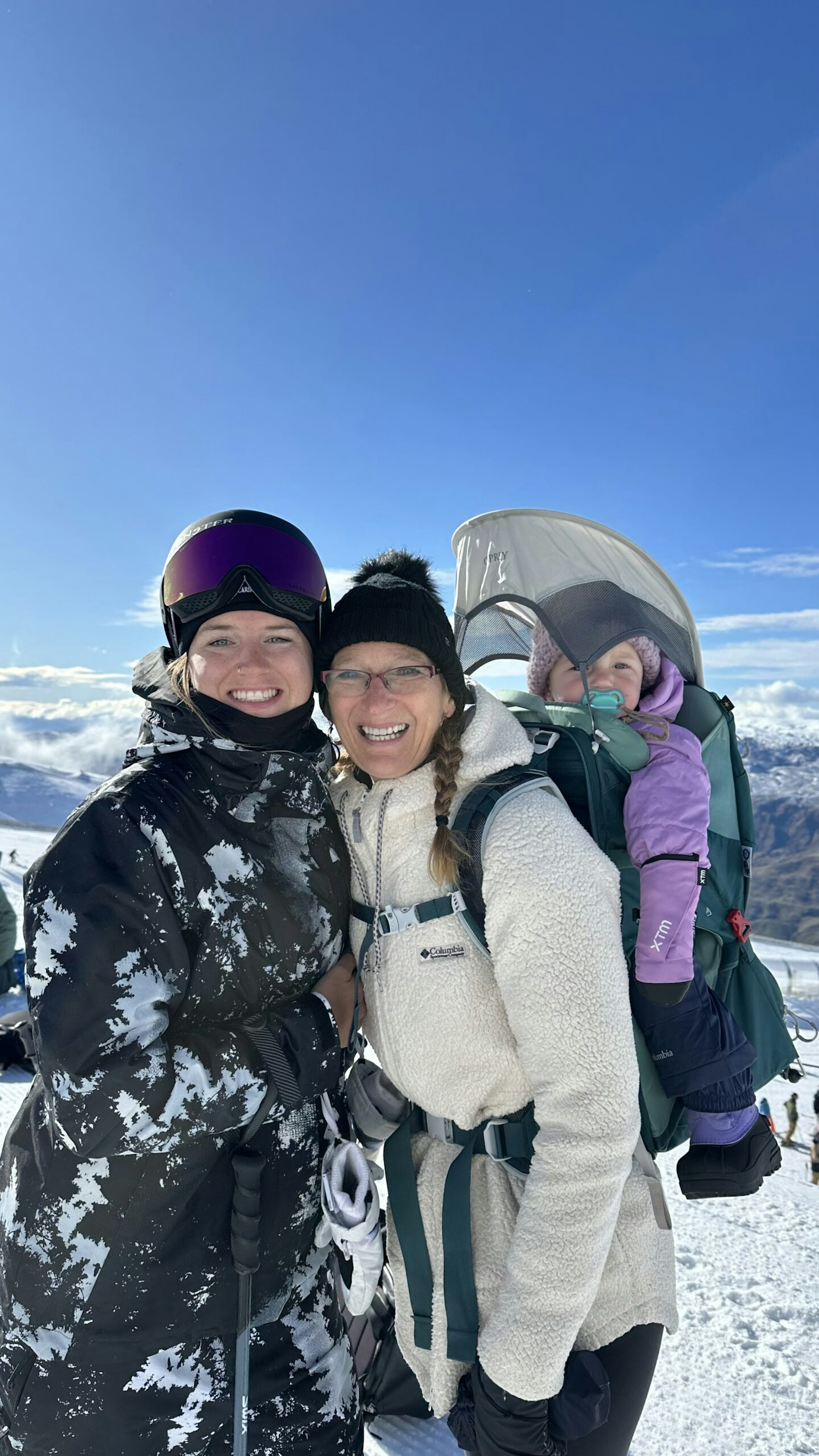
How did your sponsors react when you told them you were going to have a baby?
Everyone was pretty supportive. I think some of them could see it coming, so it wasn’t too big of a shock, but all of them were super supportive. When I decided I was going to come back, they were all like, “Hell yeah, let’s go! What do you need, what do you want?”
Columbia sent me a big box of stuff for Lou so she’s all decked out in the sickest little snow kits and snow boots. I think having a comeback like this is also pretty cool for storytelling—showing what moms are capable of.
Prior to and now after having a baby, do you ever experience mental blocks or performance anxiety around competing? How do you manage the mental side?
I think you’d be superhuman if you didn’t experience that. I think that even the best of the best get some mental blocks once in a while. We work with a team psychologist and are provided with all kinds of tools to use, but I think one of the biggest things is actually leaning on your people around you. I FaceTime my husband three times a day some days, if I’m having a bad day. We just talk it through, what’s going on, why isn’t this working, and sometimes all I need is a big ol’ cry and then I pull up my pants and get back to it.
Do you find yourself thinking about your baby before you drop in?
I honestly haven’t yet. I think about her right after my run. I get to the bottom and I’m like, where is she? I want to find her, I want a hug. I’ve been in this competition mindset for so many years that I’m pretty locked into my mental performance at the top of the pipe, I’m not thinking about much else.
Have you put your baby on skis yet?
No…I think we’ll probably wait until she can talk and say, “I want to go skiing.” She’s walking and ripping around quite a bit and I have no doubt that she’d be totally fine to try this winter but I don’t think we’re in a rush to get her up there. I think too, there’s just so many injuries associated with skiing and halfpipe and freestyle. Justin retired from halfpipe skiing because of head injuries, he’s just had too many concussions and so I think for him, especially if we can avoid sports where she’s going to get head injuries, those are the sports we’re putting her in. If she ever wants to do this sport, we will always support her, but I’m thinking gymnastics, dance and chess—fencing [laughs]?
How does she feel about the cold and snow?
She is totally unbothered, eating snow, trucking around. The last time she was up in the snow walking around she was just starting to walk so she was a little bit wobbly but she loves it.
Obviously training and practice in the pipe are important leading up to a big competition like X Games, but what other things do you do to get mentally and physically ready?
Obviously I’m going to the gym, I’m in the gym three times a week working out but I also trampoline quite often and just go do flips and spins to keep my air awareness. Every once in a while I’ll go rollerblading just to practice balance and rotations. Other than that, because I’m away so much, what actually helps my performance is spending time with my family. Justin and I will go for hikes, Lou and I go to the pool. Over the two years that I wasn’t competing I actually loved getting into a routine, so whenever I come home from traveling, I try to jump back into that routine.
Are you listening to music while you’re practicing in the pipe? What’s on the playlist?
Oh yeah! I’m a dance music, pop kind of girl. I like something to hype me up. Currently it’s an artist called Inji; she’s like dance club, techno music with catchy lyrics and that’s my go-to at the moment.
What’s your gear setup? Skis, boots, bindings, outerwear, etc.
We’ll go toe to head. I’ve got Zuma skis, a cool brand from Japan and I’ve been on their skis since 2017. I’ve got Surefoot boots with custom insoles because if I’m spending that much time in my ski boots they better be comfortable and also have a heater in them. I’ve got my Columbia outerwear and usually Columbia gloves. I’ve got my Lululemon face mask, Giro goggles and Monster helmet.
Do you have any pre-X Games traditions or superstitions?
I try so hard not to have any superstitions or any must-haves. I feel like once you start doing that, it’s a slippery slope. If I could remember everything I did after winning my X Games medal I would definitely try to repeat it and recreate it, but because I make no note of it, I’m actually doing a service to myself. However, I do try to eat some protein. X Games is in the evening, so I try to go for a walk or meet up with friends for lunch and then when we get to Snowmass, we go into the athlete lounge where I’ll do a big warm up, get ready and try to hype myself up. But nothing set in stone.
What does your warm up look like?
A lot of jumping around. I usually roll around on the floor a little bit, do some yoga-esque things and then just do a lot of plyometrics like jumping and dropping off of chairs, leg swings. A pretty normal, basic warmup kind of what you would imagine what your dad would do before going out skiing is what I do [laughs].
What about a pre-comp meal? What are you snacking on before you head out to compete?
Specifically in Aspen, at the White House Tavern there’s a crispy chicken sandwich and that’s my big-time obsession food. There’s also Little Ollie’s, which is like an Asian fusion cuisine and they have a sweet and sour egg drop soup and it is incredible. I dream about it every time I get to Aspen.
What are your favorite X Games memories?
There’s a couple. We’ll start with Darcy [my little brother] winning his gold. That was a highlight for me. He won gold in Men’s Snowboarding Slopestyle and it was just a total highlight. I get more nervous watching him snowboard than I do for myself because it’s one of those things that’s out of my control, so I just have to trust he knows what he’s doing. When he won his gold I was just so proud of him—it was just the best.
Another one, I was having a bit of an off day—my parents always try to come out when we’re competing at X Games—and I fell on my first run and broke my thumb. I got to the bottom, my hand was shaking, so my coaches taped up my thumb and then taped my pole to my hand. I panicked, I went back up for my next run and fell again. I came back down to the bottom of the pipe, I was all frazzled—when I’m competing my mom knows not to talk or mess with me, I’m in the zone and I’m talking to my coaches, I’m not really talking to them. But she comes over and grabs the scruff of my jacket and she points a finger right in my face and she said, “You take a deep breath right now! Compose yourself, go back up there and do what you know what to do.” I was like [sheepishly] “Okay.” Then she said, “Focus on what you’re doing right now,” and I’m like “Okay mom, leave me alone.”
Then I went back up to the top, I landed my run and I ended up on the podium and I just remember going back to my mom saying thank you and she said, “I know I can’t do that every time but you needed it.” And she was right. It was really special and still tears me up a little bit. She knew the right thing to say at the right time.
How did your parents raise two X Games gold medalists?
Honestly, I have no idea. My dad took a job at Mt. Washington on Vancouver Island when I was 12 and that played a huge role in us being a mountain sports family because we were out riding all of the time. I have two brothers, one older and one younger, and we all just ended up going out riding, egging each other on. My brothers would always tell me I had to do a backflip and call me all sorts of names if I didn’t want to do it, and then I’d do it. That’s how we’d push each other and we’d compete in mogul competitions at Mt. Washington. If my dad didn’t have that job, we would have never been able to afford skiing because it’s such an expensive sport. It was so much fun growing up skiing independently. We were able to just rip around the park and be little shits, it was awesome.
What do you hope to achieve at this year’s X Games?
I think it all comes back to the fun. This year I’m trying to take the pressure off and let it be what it is. It’s the hardest thing in the world for me because I’m a very competitive person but just allowing myself grace—knowing I took two years off, I’m coming back to it. I just want to go and have a really good time, I want to have fun, I want to laugh, I want to play and film and enjoy myself. If, out of that enjoyment, I get some results, that’ll be the cherry on top for me.
When you’re not competing, what are your favorite events to watch at X Games?
I obviously really enjoy watching Men’s Snowboard Slopestyle with Darcy in there and Mark McMorris, our Canadian heartthrob always kills it. And then, they didn’t have it the last year I was there, but the snowmobiles. That is always so sick to watch, they just flip snowmobiles around and it’s terrifying and so impressive.
Outside of the pipe, what does the ideal ski day look like to you?
This is exactly full circle. It’s being in Whistler on Blackcomb with like three inches of fresh pow in the morning ripping some freshies, then in the afternoon after that all gets skied out, going into the Black Park and hitting the jumps and rails with my brothers. Having fun, the giggles, watching all the little kids kill it. Some of those little groms out there hitting those jumps are wild and impressive. And then a caesar to finish off the day.
Presented By:


![[Q&A] Catching up with Cassie Sharpe Amidst her Return to Winter X Games](https://www.datocms-assets.com/163516/1751442530-cassiefeat.png?auto=format&bg=FFFFFF&w=100)
![[Q&A] Catching up with Cassie Sharpe Amidst her Return to Winter X Games](https://www.datocms-assets.com/163516/1751442530-cassiefeat.png?auto=format&bg=FFFFFF&w=1200)
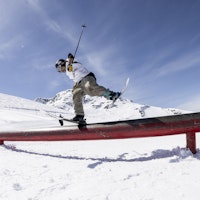

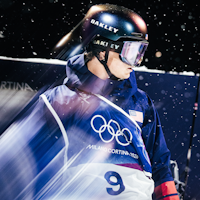
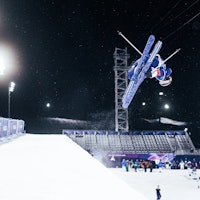
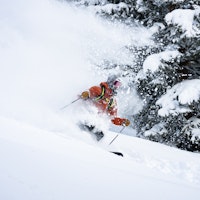
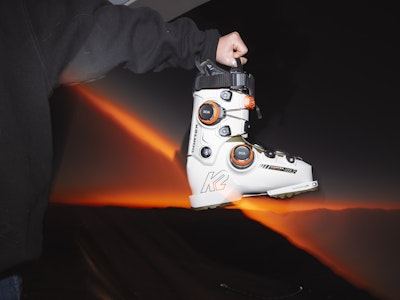
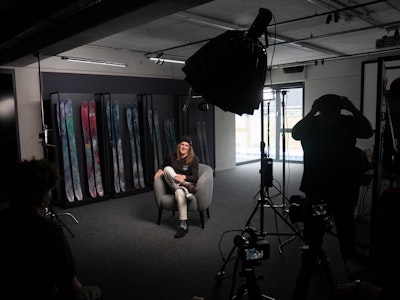
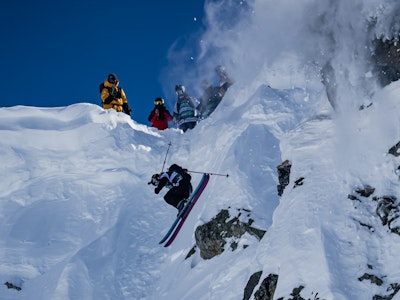
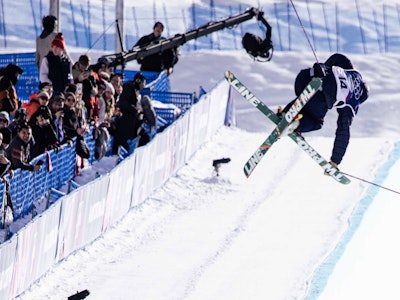
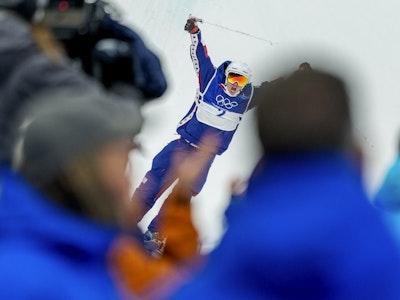
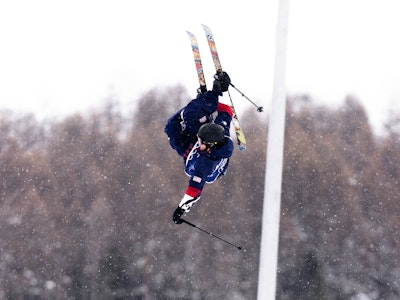
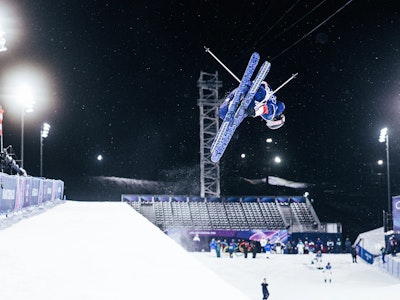
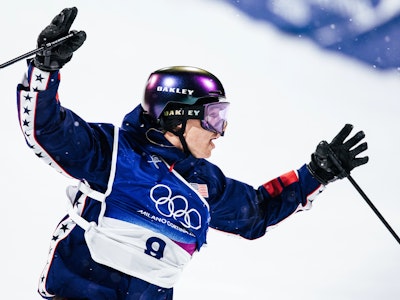
![[Q&A] Catching up with Cassie Sharpe Amidst her Return to Winter X Games](https://www.datocms-assets.com/163516/1751442530-cassiefeat.png?auto=format&bg=FFFFFF&w=2000)